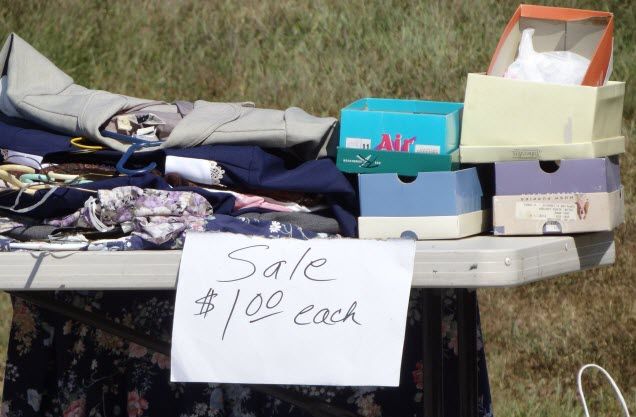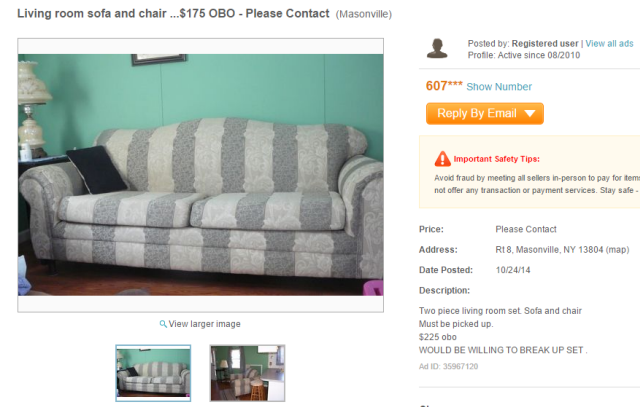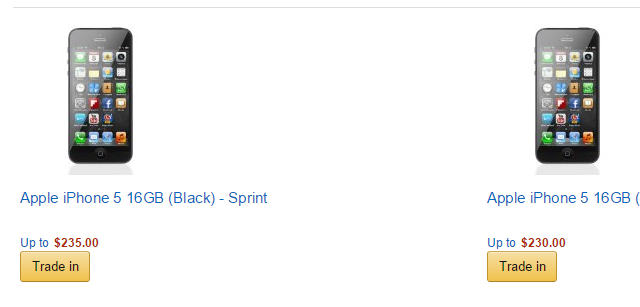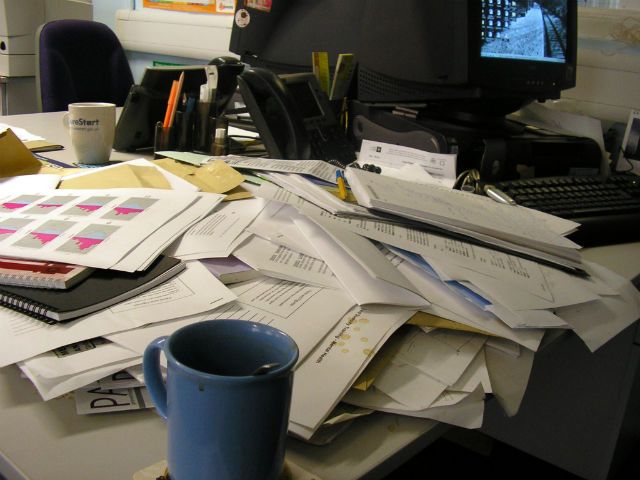Stuff. Stuff. Stuff. Our lives are consumed with stuff. Our drawers and shelves are crammed with things you bought years ago in a sale and thought it would be a good idea to buy. Now you look at it and think to yourself "what the hell was I thinking?". Your book collection looks as if it is in the running to beat the Library of Alexandria's size and magnitude. Meanwhile you are paying several hundred dollars a month for a storage facility to hoard all the rest of your crap....
It has to stop. As the New Year approaches (and with a lot of dreck that you may receive over Christmas), it's time to step back and take stock of your life. To make an inventory of your possessions and decide what stays, and what goes on a very long one-way trip. Trust me, you'll feel a lot better when you do.
The parting will be rough and painful. Take the leap, you'll feel a lot better. I've been doing it for the past several weeks and I feel like a new man.
I have always been fascinated with the concept of minimalism, and our fascination with accumulating "stuff". I've heard of people who can pack their entire life into one bag or one box, and I've caught myself thinking "I want to be that person". Maybe you've thought this too?
Living with too much stuff has other effects on you, apart from the financial aspects.
Poor health is also a factor to bear in mind, especially depression, anxiety, and stress. Simply because you feel weighed down by everything, you have to tidy it up, dust around it, buy more storage space. You can't move to a new home because you can't stand the thought of moving everything. You can't work at your desk because you are surrounded by a huge tottering mountain of paper that threatens to fall on your head at any second. You don't feel you have the freedom to just get up and travel somewhere because who would look after all of your GI Joe collection from 30 years ago? The GI Joe's which lost their heads 20 years ago. And their arms and legs 10 years ago when the dog decided to eat them.
So as I said, it's time to clear out the house and the storage facility. It's time to improve your health and your bank account to boot. Here are some methods and sites that can help in that regard.
Sell It
Let's start with the obvious. Sell the stuff and make some money at the same time. This is a subject we have covered a lot over the years here at MakeUseOf, including selling clothes, selling your used computer games (Matt also explained how to get store credit as well as cash for your games), as well as buying and selling on Craigslist, taking it to Amazon, and eBay (although eBay won't let you sell just anything). We've also covered Craigslist-like sites as well. Also, when selling, your smartphone is your friend, whether trading unwanted stuff using an iOS device or buying and selling with an Android device.
There are two other sites which I would like to recommend. The first is eBay Classifieds. I have used the German version to great effect (and there are local versions at the other eBay sites). My wife and I sold some very large pieces of furniture within a matter of days on the site (and we had our first queries from people within literally minutes of posting the adverts). We have also sold old mobile phones and old tablets for unbelievable prices.
The second site -- and hear me out here -- is Instagram. I wrote about this trend back in March over at another site, where enterprising sellers are taking photos of their wares and then posting it on the Instagram site. Many fashion stores are making a lot of money in this way. Of course it only really works if you have a large enough following who are either interested in what you have to offer, or who are likely to pass your photos onto other people. But this is a burgeoning market and folks at Instagram are quite aware of what is going on, but are not bothered enough to stop it. So it's worth looking into if you have some nice stuff to sell.
Now that I think about it, another method which has just come to mind is Amazon's Trade-In program (there are identical programs at the other Amazon sites too). Here, you can see how much Amazon is willing to pay you to buy second hand items off you (warning, it's not much). But you don't get money - instead you get Amazon credit.
However, if you buy from Amazon frequently, or if there are a lot of birthdays coming up requiring Amazon purchases, then that Amazon credit is as good as cash. So in a way, you're still making money, because that credit saves you from having to spend your real cash.
As I have found out recently, the resale value of second-hand goods - especially books and DVD's - is rock-bottom, unless you have some nice rare, hard-to get stuff, such as that signed first edition of the Bible. So you need to weigh up the amount of time and energy needed to sell the stuff, versus how much reward you can expect to get out of it. If books are going for 10 cents each, then you may as well donate the books to your local library instead. Why bother for 10 cents, if you have to list them online, deal with the email correspondence with the seller, pack them, and take them to the post office? And pay the site's fees!
Give It Away
If making money is not your aim here, then why not do some good and give the stuff away? Churches and charity shops are always looking for contributions, whether that is clothes, books, childrens toys....times are tough and many families don't have jobs and / or a lot of disposable income. So if you were able to give away things you no longer need, then another family or individual may benefit?
Don't need that suit anymore? Then donate it to a charity shop and an unemployed person going to a job interview can buy the suit and ace the job. Your kids have outgrown their toys? Then donate them to the local orphanage or childrens hospital. Your payment? A warm glow from making someone else feel happy.
Or you could simply give things to your closest family and friends. I pass on DVD's to my father-in-law all the time, and I sometimes give the occasional book away if it was too bad to deserve staying on my shelf. One site I like for this is Bookcrossing. And for all kinds of things, there is of course the very well known FreeCycle.
4 Sites That Can Help & Inspire You
As you can imagine, on an Internet that caters to anyone with any interest and any fetish, there are countless sites dealing with minimalism and decluttering. They vary in quality but here are the ones you should be paying attention to, if you have any serious interest in the subjects. Minimalist Packrat also maintains a list of over 100 you can also peruse.
The grandaddy of the minimalist movement. This is guaranteed to help you along your way to getting your life uncluttered. The owner of the site, Erin Doland, has also written an Unclutterer book which I highly recommend.
Apartment Therapy is not an actual minimalist blog. It is more a design blog for apartments. But they occasionally have decluttering posts, such as "5 Strategies for Decluttering a Small Space", and "Pro Organizer Tips: What NOT To Do When Decluttering Your Home". The design tips for small apartments should also inspire you to keep an uncluttered living space.
A minimalist site which should give you some great ideas. The site owner managed to simplify her life so much that she and her husband managed to pay off an $80,000 (CDN) debt in under 2 years. She sold and recycled 5 carloads worth of stuff (including 4 carloads of clothing), as well as another carload and their furniture when they decided to move overseas.
Like "Apartment Therapy", Zen Habits is not a decluttering blog, but rather a blog promoting simpler living. So it stands to reason that they would occasionally cover the concept of minimalism, as that is as Zen as it gets. Examples include 15 Great Decluttering Tips, and the Quickstart Guide To a Decluttered Home.
I also highly recommend this Lifehacker post on the subject, which I have had bookmarked for quite some time now.
Move The Paperwork!
Before I end this article, I would like to briefly mention the paperwork. Paper is insidious. While many companies and government departments have got on board with the whole paperless digital revolution, many have not. So despite your best efforts, paper is going to find its way through your front door. So you need to keep on top of it. Clear all the paper off your desk and from your shelves. Make one big pile to assess how bad the problem is.
The first thing is to sort through all of the paper and divide it into two piles - KEEP and DITCH. The DITCH pile will include paid bills, junk mail, old magazines, old newspapers, and generally anything else which is clearly not needed to be kept. This stuff can right away be tossed into the trash (but anything with sensitive information on it MUST be shredded first, or at the very least, ripped into tiny little pieces).
This leaves the KEEP pile. This can include things like personal correspondence, tax documents, newspaper and magazine articles you want to keep (if there is no online version), and official documents such as your birth certificate, marriage certificate, property ownership documents, will.....etc.
Now I know some people will disagree but I do NOT recommend scanning your official documents into Evernote, or a similar program such as OneNote. Maybe it's my paranoid side coming out, but cloud servers can be hacked, and if they do, do you really want your birth certificate out there in the hands of a hacker?
But for things like personal correspondence, and articles, you can scan those documents into Evernote or OneNote, and then destroy the paper copies. Paper degrades, so it is much better to be digital instead. Just make sure to update those databases on a regular basis!
Now, stop reading and start decluttering before the laziness of the holidays hits you.
What decluttering methods do you recommend? Tell us what works for you in the comments.
Image Credits: Big pile of clothes Via Shutterstock, Yard Sale - Morguefile, Messy Desk - Morguefile, Paper Stack On Desk - Shutterstock, Guitar Playing Nun - Shutterstock













